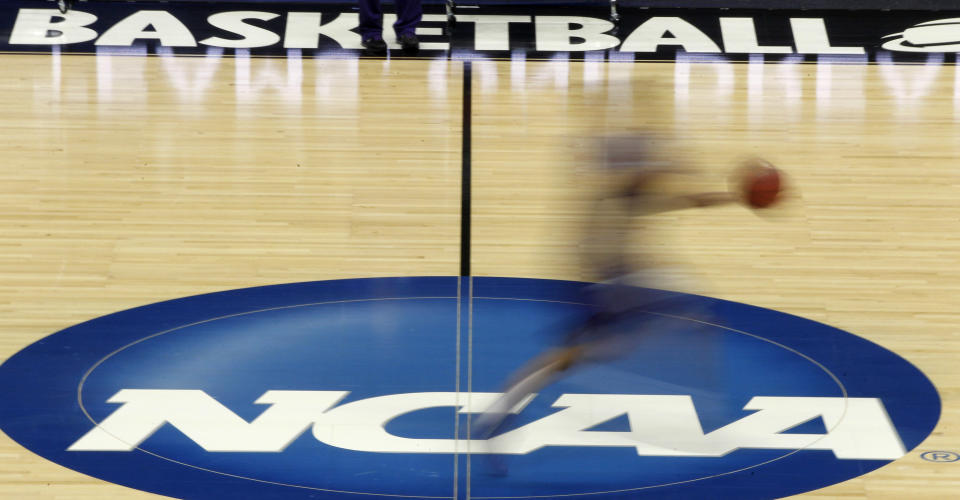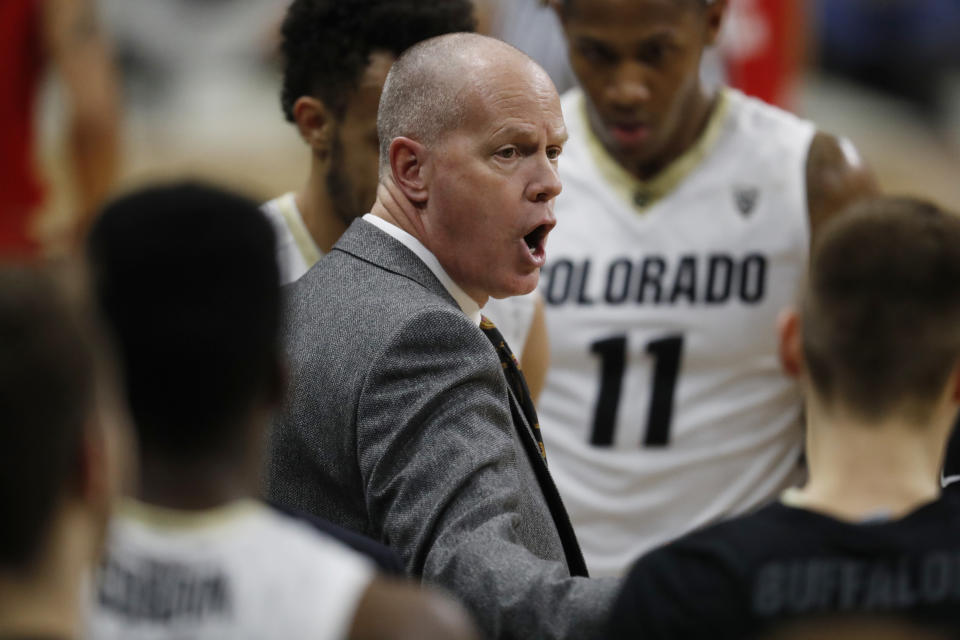What coaches say must happen for the federal probe to incite meaningful change

When he and his staff scout high school prospects, Colorado men’s basketball coach Tad Boyle has to worry about more than if a potential recruit is good enough to play for the Buffaloes.
Boyle also has to assess whether or not a kid’s inner circle expects to be paid in return for steering him to a particular school.
Anytime a prospect’s family members or coaches imply that an under-the-table payment is required to become a serious contender in the recruitment, Boyle says he ends his pursuit right away. Boyle says he also typically stops recruiting a promising prospect if other schools with a reputation for cheating to obtain talent become involved.
“Every single year it happens multiple occasions, and it’s been that way for the seven-plus years I’ve been at Colorado,” Boyle said. “Every single year, multiple kids. We have to make those decisions pretty quickly because if you get too far down the line, you’re wasting a lot of time with a kid that’s not going to end up at Colorado.”
Coaches who are fed up with college basketball’s rampant bribery and corruption are clinging to hope that the sport may finally be on the cusp of meaningful change.
Federal authorities blew open the doors to the unsavory, shadowy world of college basketball recruiting on Sept. 26 when they indicted 10 men in a widespread fraud and bribery scheme involving top recruits, prominent coaches, agents, financial planners and shoe-apparel executives. FBI agents have since raided the office of high-profile agent Andy Miller and subpoenaed employees of Nike’s EYBL grassroots division, strong indications that many more prominent college basketball programs will be ensnared before this investigation is over.
Past recruiting scandals have typically incited more outrage than reform, but this one should at least serve as a short-term deterrent to rules breakers given its scope and the FBI’s involvement. The impact is unlikely to be long-lasting though unless college administrators ditch the outdated concept of amateurism and commit to implementing a free-market model for college basketball that would stamp out the thriving black market for top prospects by permitting them to accept payments from agents or shoe-apparel companies aboveboard.
“I don’t know if anyone is happy this situation has come to light, but it could be a positive in the long run if it cleans up our game,” Georgia coach Mark Fox said. “We’ve lost some kids where we had suspicions [they received money to go to other programs] and we’ve avoided some kids where we sensed the road it was going. Unfortunately, it’s not as uncommon as it should be.”
For decades, the unseemly way that elite players are bought and sold has been college basketball’s worst-kept secret.
College coaches and shoe-apparel companies often funnel tens of thousands of dollars to the families or handlers of top prospects in exchange for their influence on what school the player chooses. To a college head coach, landing one strong recruiting class can be the difference between being fired and signing a multimillion-dollar extension. To a shoe-apparel giant, steering an elite prospect to a particular school is a way to stack the deck in favor of that program and ensure maximum return on an eight- or nine-figure sponsorship agreement.
One head coach at a power-conference school described the battle to land heralded high school basketball prospects as a “free-for-all” and compared it to “human trafficking.”
“It’s lawless,” he added. “The parents view it as, ‘Time to get mine.'”

Under-the-table bribes are also common from agents and financial advisers seeking to secure a player’s business when he’s ready to turn pro. A five-figure investment in a 17-year-old McDonald’s All-American has the potential to lead to a far bigger payday when that prospect signs his first NBA contract.
Where players suffer most in that arrangement is that the most reputable agents and financial advisers are often hesitant to resort to impermissible schemes to attract potential clients. As a result, handlers who accept bribes frequently steer prospects toward unscrupulous, inexperienced agents or financial planners, putting players at increased risk of fraud or mismanagement.
Andre Mirkine, a founding member of the Sports Financial Advisors Association, learned to stop pursuing NBA prospects as clients after finding that his résumé alone wasn’t enough to persuade any of their handlers to set up a face-to-face interview. He prefers seeking NBA veterans or retiring players as clients instead because he knows he’ll be judged solely on his credentials.
“With the rookies, there was an inability to get beyond the gatekeepers,” Mirkine said. “I would tell them who I am, what I was about and all of the good things I’ve done in my career, and it didn’t matter. I don’t know why I couldn’t get past them, but I couldn’t. I was the most ethical, most experienced, best credentialed guy they could speak to, but I wasn’t getting past first base.”
College basketball’s cheaters have more often than not managed to stay one step ahead of the NCAA’s overmatched enforcement division, but law enforcement agencies pack more investigative clout. Federal authorities can tap phones, obtain search warrants, force uncooperative witnesses to testify and penalize false testimony with perjury charges. They also have the threat of jail time to persuade arrestees to save themselves by testifying against higher-profile figures.
A coach would have to be very brazen to arrange for payments to current players or recruits for however long the FBI continues to sniff around college basketball. Boyle believes everything will gradually revert back to normal once the FBI loses interest though unless the NCAA consistently levies stronger punishments against coaches caught cheating and college administrators make it clear that a successful coach fired because of rules violations will not receive a second chance.
“It comes down to the NCAA and our administrators,” Boyle said. “If those two things happen, this thing will have long-lasting implications. If they go back to the way it was, it will pass like a storm and the problems will come back.
“When you see coaches who have been fired for breaking NCAA rules and then rehired elsewhere, that sends a message loud and clear to coaches that if you win and you get caught cheating, there’s another chance down the road. if you lose and you’re clean on the other hand, you may not be hired again.”
Many in college basketball circles aren’t convinced stricter punishments for rule breakers would be enough to clean up the sport. They instead favor a dramatic overhaul of college basketball’s current model.
Some want to plead with NBA commissioner Adam Silver to eliminate the one-and-done rule so that the most valuable prospects in every class can go directly from high school to the draft. Others believe the key is limiting the influence that shoe-apparel companies have on high school prospects by wresting control of grassroots basketball away from them. A growing number of forward-thinking coaches and administrators endorse a free-market system in which the inevitable flow of money between agents, shoe companies and top prospects would be entirely permissible and out in the open.
Ohio University professor David Ridpath, author of the upcoming book “Alternative Models of Sports Development,” favors even more radical change. Ridpath argues the U.S. needs to adopt a more European-like model in which the country’s premier young athletes would be able to earn money in a developmental system run by a professional league rather having to participate in high school or college athletics.
“We need to accept the model we have now isn’t working and discuss some alternatives,” Ridpath said. ” If we truly want school-based sports, we can do that, but we need to have elite development options outside the educational space. There shouldn’t be this collusion between the NCAA and NBA where prospects are essentially forced to go into the NCAA so we can have our entertainment, the schools can make money and the NBA gets better developed players.”
If Boyle became czar of college athletics for a day, he says he’d adopt the free-market model in hopes of transforming basketball’s black market into an open market.
The Colorado coach believes that would solve many of the problems laid bare by federal investigators. Boyle is just skeptical that NCAA president Mark Emmert or other high-profile college administrators are prepared to admit that the current system of amateurism isn’t working.
“I have zero confidence that will happen,” Boyle said. “There would have to be somebody in a leadership position that believes this would not damage the integrity of our sport or make these guys professional athletes but it would allow them to reap some benefits in a sport that is making literally billions and billions of dollars. It would have to come from the school presidents or the NCAA, but I just don’t think they’re going to go there.”
– – – – – – –
Jeff Eisenberg is the editor of The Dagger on Yahoo Sports. Have a tip? Email him at daggerblog@yahoo.com or follow him on Twitter!


